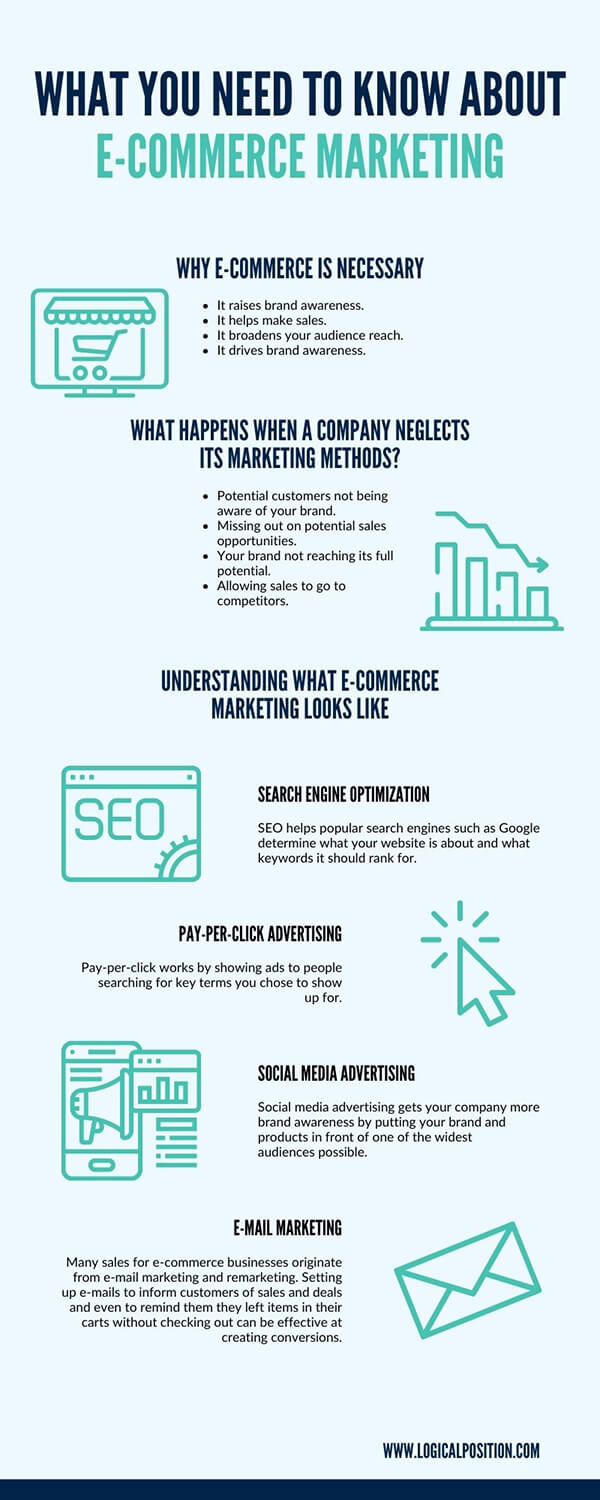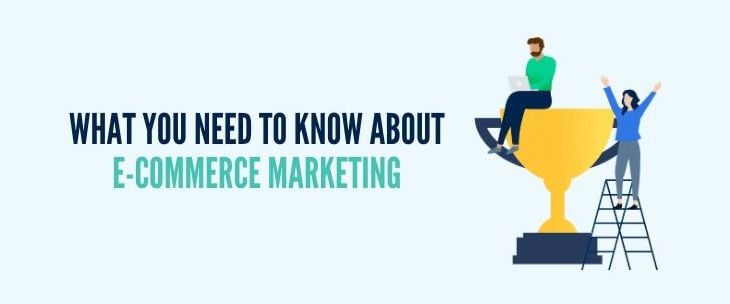E-commerce is a booming industry right now. Online shopping has steadily gained much popularity through the past decade, but it has skyrocketed more than usual in the last year. With the COVID-19 pandemic, many consumers made the switch to shopping online exclusively or nearly exclusively as brick-and-mortar stores shut down for much of the year.
With this exponential growth in the demand for e-commerce businesses, the market is rapidly becoming saturated. Fierce competition within the field and rapidly increasing demand makes marketing essential to the success of an e-commerce business. However, a prominent issue in the e-commerce industry is a lack of online visibility. Market saturation is a battle most e-commerce companies face daily.
Digital marketing can combat a business’s struggle to be seen and noticed. Many companies sell the same or similar products, but if the consumer can find one site more easily, they’re more likely to purchase from it than from a competitor site. Explore what you need to know about e-commerce marketing to maintain and increase your business’s online visibility and to continue to make sales.
The Importance of Marketing for E-Commerce Companies
Marketing is essential for any company, but it’s even more crucial for e-commerce companies. E-commerce relies solely on online sales. Online sales are plentiful—but so are e-commerce businesses. Consumers could spend hours searching for the exact product they want and find different versions of it on hundreds of other websites—but why bother? The average customer won’t search through multiple pages of search results or research a product through hundreds of companies before purchasing. Most of the time, they’ll experience exposure to the product. Then, they may research a bit. Research time can differ significantly, depending on the product and its typical buy cycle. Then, the customer makes a purchase.
The buy cycles for products often differ greatly depending on the price, type of product, and audience. Even within specific product categories, there can be differences. Below are a few examples:
An online lotion business may have a buy cycle of one hour to one month, depending on the customer. Some customers may see an advertisement for lotion, click on it, and buy it right away. Others may need to think about the purchase for a day or so while deciding if they need the lotion. Still others may take a few days to think about the lotion purchase, forget about it, see a remarketing ad, and purchase through that click weeks later.
Another example is a product that may have a longer buy cycle. Consider an industrial label printer. It’s an expensive purchase with a target audience of a business. A business may take longer to think about a purchase and do more research than an individual consumer. This buy cycle could take months or even years to come to a final decision.
Knowing your products and target audience is essential to assessing what kind of window for a buy cycle your company should expect. Buy cycles inform your digital marketing campaigns and identify if they’re working.
Why E-Commerce Is Necessary
Marketing is especially vital for e-commerce businesses. There’s so much market saturation online that companies must market their products to stand out to consumers. Sometimes visibility is all it takes to knock out your competitors. E-commerce sites need to market to stay visible to consumers and to build reliability online. Below are just some of the positive benefits of investing in digital marketing for your e-commerce company:
- It raises brand awareness.
- It helps make sales.
- It relays product information to potential customers.
- It broadens your audience reach.
- It drives brand awareness.
What Happens When a Company Neglects Its Marketing Methods?
When an e-commerce company doesn’t market its products or brand, there can be devastating results. Nearly every industry within the e-commerce market is saturated. E-commerce sites are investing significantly in digital marketing. This means your company’s competitors are investing in marketing, which translates to increasing their brand awareness and gaining business from customers who may have otherwise purchased from your company. There’s no avoiding digital marketing for e-commerce anymore—it’s essential! Neglecting to invest in digital marketing can result in:
- Potential customers not being aware of your brand.
- Missing out on potential sales opportunities.
- Your brand not reaching its full potential.
- Allowing sales to go to competitors.
- The loss of a vast opportunity to reach new customers and expand your brand.
Understanding What E-Commerce Marketing Looks Like
E-commerce marketing has many different looks. There are multiple ways to market your product digitally to reach your target audience effectively. Discover more below.
Search Engine Optimization
Search engine optimization, or SEO, is something worth investing your time and energy in. SEO helps popular search engines such as Google determine what your website is about and what keywords it should rank for. When potential customers are looking for an item you sell—for example, scarves—they may type into their search bar “green crochet infinity scarf.” If you sell a related product, you’ll want it to show up in the customer’s search results so that they can find your brand and purchase your product. If your company shows up on the first page of the search results, your chances for converting that customer are a lot higher than a company that shows up on page 98 for that same key term. People rarely go to the last pages in the search results.
Pay-Per-Click Advertising
Pay-per-click (PPC) advertising is another must-have digital marketing method for e-commerce websites. Pay-per-click works by showing ads to people searching for key terms you chose to show up for. Imagine “green crochet infinity scarf” is a keyword in which your business is investing for PPC. When a consumer types in the keyword, your advertisement will show up in and around the organic search results. Your brand will gain exposure even if it isn’t ranking organically. Customers can click on this ad and potentially make a purchase.
Social Media Advertising
Social media advertising gets your company more brand awareness by putting your brand and products in front of one of the widest audiences possible. Everyone has some form of social media, whether they prefer Facebook, Instagram, or another platform. Finding your audience on social media is easier than ever when you have Facebook Pixel set up. Social media is a valuable resource, and investing in paid social media advertisements is a lucrative decision for e-commerce businesses.
E-Mail Marketing
E-mail marketing is another essential digital marketing resource for e-commerce companies. Many sales for e-commerce businesses originate from e-mail marketing and remarketing. Setting up e-mails to inform customers of sales and deals and even to remind them they left items in their carts without checking out can be effective at creating conversions. Putting an e-mail marketing strategy in place is essential to creating customer loyalty and extending your customers’ lifetime value.

Strategies for E-Commerce Marketing
A great thing about digital marketing for e-commerce businesses is how each campaign can inform the others. There are countless ways to utilize the data you gain from each campaign run. E-commerce is a unique industry that requires vigilant marketing efforts to maintain a loyal customer base.
There are many things to keep in mind when you’re looking to create a successful strategy for e-commerce marketing:
Goal-Setting
Goal-setting is a cornerstone of a successful digital marketing campaign for e-commerce shops. Goal-setting is truly the first step to creating a strategy. Businesses start by setting a realistic and attainable goal. They can then create a marketing plan that aims to work toward that specific goal.
Multi-Faceted Approach
There are many methods of marketing an e-commerce store. Choosing just one isn’t as effective as a campaign that allows for multiple platforms and marketing types. For example, an e-commerce company that sets a goal of increasing its impressions may reach that goal through a paid social media campaign. Still, it could achieve that goal much more efficiently with a paid social media campaign and a paid search campaign.
Utilizing Remarketing
Dynamic remarketing is an integral piece of successful e-commerce campaigns. This type of remarketing shows customers the exact product they looked at previously. Dynamic remarketing ads are relatively simple looking, but they’re widely effective at creating conversions.
Dynamic remarketing is compelling, but executing it correctly is complex. It’s often best handled by digital marketing professionals.
Letting the Campaigns Work Together
E-commerce companies that invest in multiple digital marketing methods are sure to find some successes. However, these successes may fall short when a business doesn’t use the data it collects from each method to inform other campaigns. For example, a company that invests in paid social media advertising and paid search can find success in each campaign, but that same company could see more conversions if it allowed paid search data and paid social media data to work together. When the campaigns work together, they form a clearer picture of what clients respond to and what they want.
Where To Start
All of this can be overwhelming, especially when you have a business to focus on running. Many e-commerce companies can’t invest the kind of time that successful marketing takes, so they hire professionals. Professional digital marketing agencies are great for leading campaigns to help businesses achieve their goals.
However, it’s important to remember that marketing can only go so far. If you invest in marketing—on your own or with an agency—a few things could hinder its ability to reach its full potential:
- Not keeping your online shop up to date
- Not investing in a robust project management system
- Advertising out-of-stock items.
- Failing to get operations and logistics in order
- Not preparing for an influx of sales from advertisements
For e-commerce marketing to function appropriately, your store must be ready to handle the increased orders and traffic. Otherwise, advertising can worsen issues. Before investing in a marketing campaign, ensure your site and systems can handle the increased demand.
Logical Position is a professional digital marketing agency and an awarded social media advertising company. As a Facebook Partner, we are well-informed and highly regarded for our work with the Facebook platform. Our services are unique in that we offer a range of digital marketing methods on multiple platforms. Each of these services informs the others, which creates a cohesive and effective marketing campaign for your business. Contact us today for more information and for a free consultation on our services.



